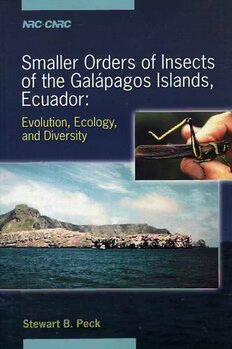
Smaller Orders of Insects of the Galapagos Islands, Ecuador: Evolution, Ecology, and Diversity PDF
291 Pages·2001·19.314 MB·English
Most books are stored in the elastic cloud where traffic is expensive. For this reason, we have a limit on daily download.
Preview Smaller Orders of Insects of the Galapagos Islands, Ecuador: Evolution, Ecology, and Diversity
Description:
The Galapagos Islands of Ecuador are world famous for their unique plants and animals, and the hints these gave to Charles Darwin in forming his ideas on evolution. They are the world's least altered set of tropical oceanic islands. The oldest have been available for colonization by land plants and animals for about 3-4 million years. At least 1850 species of insects and 350 species of other terrestrial arthropods are now known to occur on the islands. This book is a synthesis of both previously published information and abundant new data derived from extensive recent field studies on Galapagos insects. The dynamics and patterns of the evolution, ecology, and distribution of the entire insect fauna are presented in general. The core of the book is an account of the 495 species of insects in the smaller orders (excluding Phthiraptera, Coleoptera, Diptera, Lepidoptera, and Hymenoptera), with detailed information on their distribution and bionomics. This work will serve entomologists, island ecologists, evolutionary biologists, and conservation scientists as a framework to further the study and protection of the insects, the fauna and flora in general, and the islands themselves. It is a contribution to a comparative global understanding of the origin, evolution, and ecological structuring of oceanic island insect faunas.
See more
The list of books you might like
Most books are stored in the elastic cloud where traffic is expensive. For this reason, we have a limit on daily download.
